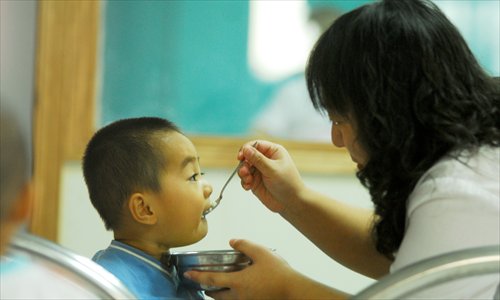Top Chinese legislator proposes a 10-year minimum sentence for child trafficking crimes

A caretaker feeds a boy, a victim of child trafficking, in a welfare center in Nanjing, Jiangsu Province. Photo: CFP
Top Chinese legislator Yan Zhi called for a further crackdown on child trafficking at this year's two sessions, proposing to adjust the minimum sentence from five years to 10 years.Yan, a deputy to the National People's Congress, said that the legal punishment for child trafficking uses the penalty on kidnapping for reference, which usually involves 10 years or more in prison.
China's existing Criminal Law regulates that those found abducting and trafficking women or children are to be sentenced to five to 10 years in prison plus fines. Criminals falling into one or more of eight certain situations, including selling abducted women or children to outside the country, will receive more severe punishments.
Those kidnapping others with the purpose of blackmailing or plans to use them as hostages are to be sentenced to 10 years or more in prison or be given life sentences, according to the Law.
Yan also called to further increase punishments on those who buy abducted children.
Yan's proposal was applauded by Chinese netizens on Friday, with many Weibo users saying that child traffickers deserve heavy punishments for their merciless wrongdoings.
"A trafficked child brings huge, irretrievable damage to his or her family," a mother wrote on Weibo on Friday, saying she couldn't imagine how heartbroken she would be if her baby girl was sold by evildoers to somewhere and someone she didn't know.
To better protect children from trafficking risks, Yan also proposed a complete and traceable identity identification system to be established for newborn babies, and suggested to include fingerprint registration for newborns into their identity registrations as a necessary process.
Global Times
